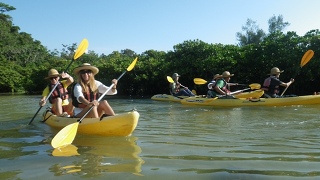KIWC ran training sessions on eco-tourism for developing countries in Asia, Central America and Eastern Europe from August 25 to September 30, 2014. Under commission from the JICA Hokkaido International Center (Obihiro), the sessions focused on the sustainable use of local natural and cultural features as tourist resources by local residents in order to boost regional economies and raise local environmental awareness. The training was attended by 10 people from 10 countries, consisting of government administrative officials in tourism promotion and natural park management, NGO staff and others from Bhutan, Georgia, Guyana, Kosovo, Mexico, Mongolia, Myanmar, Suriname, Albania and Turkey.
The trainees visited natural parks and wildlife protection areas, including Lake Shikaribetsu (Daisetsuzan National Park), Kushiro-shitsugen (Kushiro Wetland), and Akkeshi-ko and Bekambeushi-shitsugen under the guidance of Course Leader Mr. Hisashi Shinsho (KIWC Technical Committee Chair). They learned about tour operation with due consideration for the environment and wildlife, visitor center utilization and other matters, and also learned about examples of local industry utilization (e.g., stock farming and fishery) in tourism, including experiential tours on horseback, fishing boats and a fishermen’s lodge known as banya.
In Tokyo and Kyoto, the trainees experienced tour programs featuring elements of Japanese history and culture, such as traditional art, historic sites and satoyama (community-based forest areas), and were given presentations on the theory and policy of eco-tourism. They also visited Okinawa to learn about a youth job creation initiative based on eco-tourism.
The trainees interacted well despite their diverse geographical and cultural backgrounds, collecting and sharing useful ideas for tourism promotion in their own countries and finding time in their busy schedules to explore Japanese cities between sessions.



